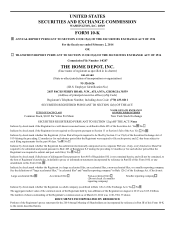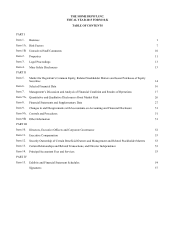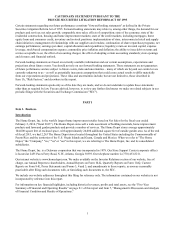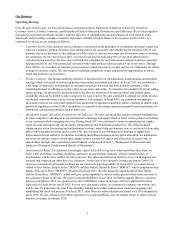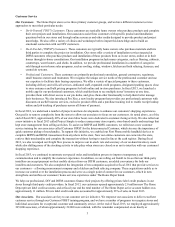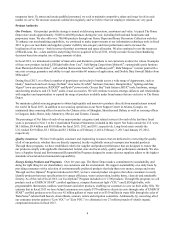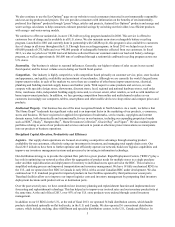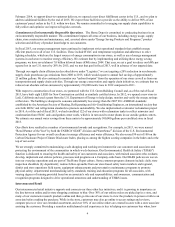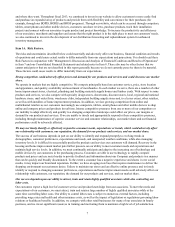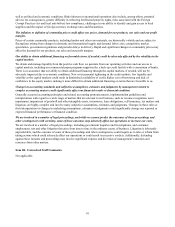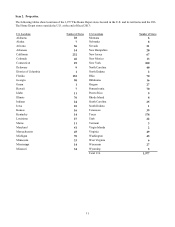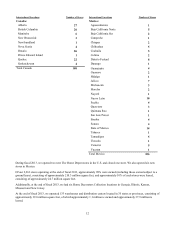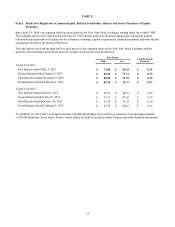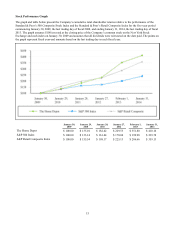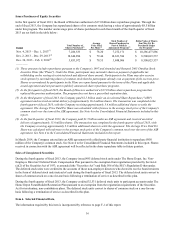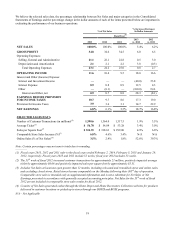Home Depot 2013 Annual Report Download - page 14
Download and view the complete annual report
Please find page 14 of the 2013 Home Depot annual report below. You can navigate through the pages in the report by either clicking on the pages listed below, or by using the keyword search tool below to find specific information within the annual report.
9
If we are unable to effectively manage and expand our alliances and relationships with selected suppliers of both brand
name and proprietary products, we may be unable to effectively execute our strategy to differentiate ourselves from our
competitors.
As part of our focus on product differentiation, we have formed strategic alliances and exclusive relationships with selected
suppliers to market products under a variety of well-recognized brand names. We have also developed relationships with
selected suppliers to allow us to market proprietary products that are comparable to national brands. Our proprietary products
differentiate us from other retailers, generally carry higher margins than national brand products and represent a growing
portion of our business. If we are unable to manage and expand these alliances and relationships or identify alternative
sources for comparable brand name and proprietary products, we may not be able to effectively execute product
differentiation, which may impact our sales and gross margin results.
The implementation of our supply chain and technology initiatives could disrupt our operations in the near term, and
these initiatives might not provide the anticipated benefits or might fail.
We have made, and we plan to continue to make, significant investments in our supply chain and technology. These
initiatives are designed to streamline our operations to allow our associates to continue to provide high quality service to our
customers, while simplifying customer interaction and providing our customers with a more interconnected retail experience.
The cost and potential problems and interruptions associated with the implementation of these initiatives, including those
associated with managing third-party service providers and employing new web-based tools and services, could disrupt or
reduce the efficiency of our operations in the near term. In addition, our improved supply chain and new or upgraded
technology might not provide the anticipated benefits, it might take longer than expected to realize the anticipated benefits, or
the initiatives might fail altogether, each of which could adversely impact our competitive position and our financial
condition, results of operations or cash flows.
Disruptions in our supply chain and other factors affecting the distribution of our merchandise could adversely impact
our business.
A disruption within our logistics or supply chain network, including damage or destruction to our distribution centers or
weather-related events, could adversely affect our ability to deliver inventory in a timely manner, which could impair our
ability to meet customer demand for products and result in lost sales, increased supply chain costs or damage to our
reputation. Such a disruption could negatively impact our financial performance or financial condition.
If we are unable to manage effectively our installation service business, we could suffer lost sales and be subject to fines,
lawsuits and damaged reputation.
We act as a general contractor to provide installation services to our DIFM customers through third-party installers. As such,
we are subject to regulatory requirements and risks applicable to general contractors, which include management of licensing,
permitting and quality of our third-party installers. We have established processes and procedures that provide protections
beyond those required by law to manage these requirements and ensure customer satisfaction with the services provided by
our third-party installers. If we fail to manage these processes effectively or provide proper oversight of these services, we
could suffer lost sales, fines and lawsuits, as well as damage to our reputation, which could adversely affect our business.
Our costs of doing business could increase as a result of changes in, increased enforcement of, or adoption of new
federal, state or local laws and regulations.
We are subject to various federal, state and local laws and regulations that govern numerous aspects of our business.
Recently, there have been a large number of legislative and regulatory initiatives and reforms, as well as increased
enforcement of existing laws and regulations by federal, state and local agencies. Changes in, increased enforcement of, or
adoption of new federal, state or local laws and regulations governing minimum wage or living wage requirements, other
wage, labor or workplace regulations, the sale of some of our products, transportation, logistics, supply chain transparency,
taxes, energy costs or environmental matters could increase our costs of doing business or impact our store operations.
Healthcare reform under the Patient Protection and Affordable Care Act and the Health Care and Education Reconciliation
Act of 2010 could adversely impact our labor costs and our ability to negotiate favorable terms under our benefit plans for
our associates.
If we cannot successfully manage the unique challenges presented by international markets, we may not be successful in
our international operations.
Our ability to successfully conduct retail operations in, and source products and materials from, international markets is
affected by many of the same risks we face in our U.S. operations, as well as unique costs and difficulties of managing
international operations. Our international operations, including any expansion in international markets, may be adversely
affected by local laws and customs, U.S. laws applicable to foreign operations and other legal and regulatory constraints, as


